Duke Ernst Medal, in Silver
CATEGORY: Version
SKU: 02.SXC.0113.102.01.000
Estimated market value:
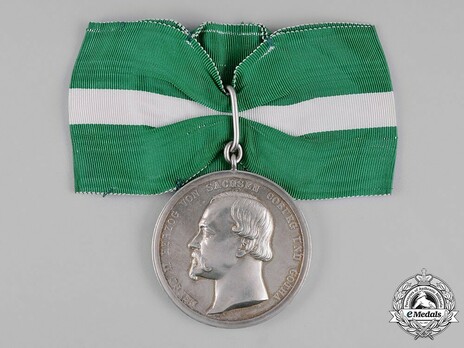
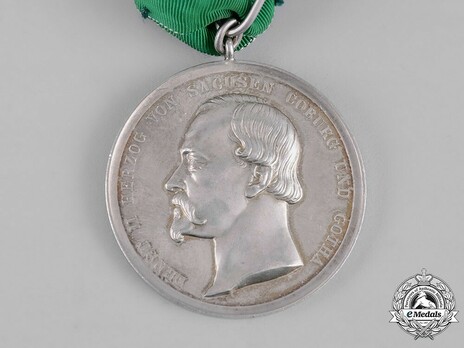
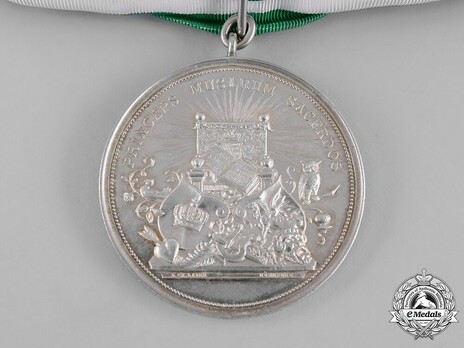
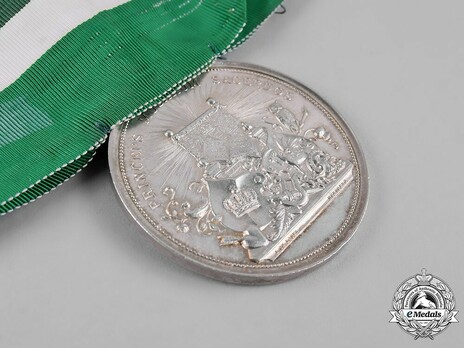
Estimated market value:
Constructed of silver, on loop for suspension from its period original shortened neck ribbon, the obverse with a raised leftward-facing profile of Ernst II circumscribed by name and title, the reverse with inscription “PRINCEPS MUSARUM SACERDOS”, above a richly-detailed design reflecting the medal’s focus on arts and culture.
A smooth circular medal with a raised border, constructed of silver. The obverse features the left-facing portrait of Duke Ernst II with the circular inscription ‘ERNST II HERZOG VON SACHSEN COBURG UND GOTHA’. The reverse features the semi-circular inscription ‘PRINCEPS MUSARUM SACERDOS’ at the top half. A pearled line runs around the entire medal. In the centre is a throne, surrounded by rays and featuring the Saxon coat of arms on the backrest. On the throne is an open book with the inscription ‘ZAIRE SANTA CHIARA’ on the left side and ‘DIANA VON SOLANGE CASILDA’ on the right side (two operas composed by the duke). Two shields are leaning against the throne, the one on the left features a crown, the one on the right features a pegasus. Around the throne are several more symbols, including a dove on a rose twig, a heart pierced by an arrow, a palm branch, a lyre with a sword, a laurel twig, a Janus face, and an owl sitting on a branch. The throne is situated on a pedestal, which features the manufacturer’s and stamp cutter’s signatures ‘L. CHR. LAUER NÜRNBERG H. STROBEL’. To the left of the eyelet are silver marks in the form of a crescent, a crown, and the number ‘0,990’. On a loop for suspension, on a ribbon of equal parts green/white/green.
As of 1889, the medal doesn't feature the stamp cutter's signature, and the silver mark is "SILBER 0,990". The ribbon used from then on is green on the left half and white on the right half.
The Duke Ernst Medal was instituted by Duke Ernst II of Saxony-Coburg and Gotha on February 17, 1888. It was awarded for those services that were not covered by the Saxe-Ernestine House Order Medals or the Medals for Art and Science.
The medal was awarded with an accompanying document and had to be returned after the recipient’s death, unless the family received a written statement from the duke himself that allowed them to keep it.
The medal was planned to have a wearable and non-wearable form, however, non-wearable medals were not awarded. On February 21, 1889, a medal in the form of a neck decoration was added to the statutes.
The medals were manufactured by L. Chr. Lauer in Nuremberg. The stamps were cut by H. Strobel, also from Nuremberg.
The smaller medals of 34mm in diameter, although not official, were made by Lauer with the approval of the duke, since the regular sized 50mm medals turned out to be too large and therefore impractical. The smaller medals were much more popular at the time.
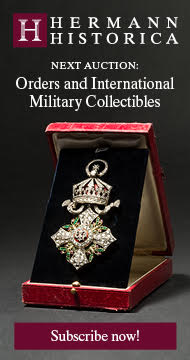
Comments
Sign in to comment and reply.


Scroll Top